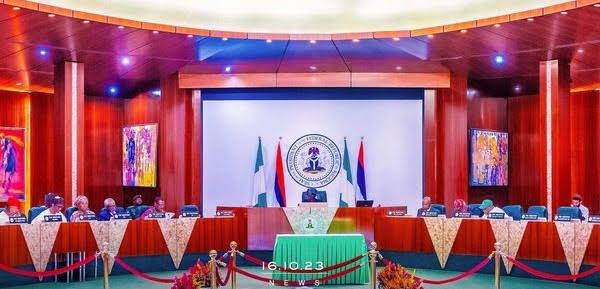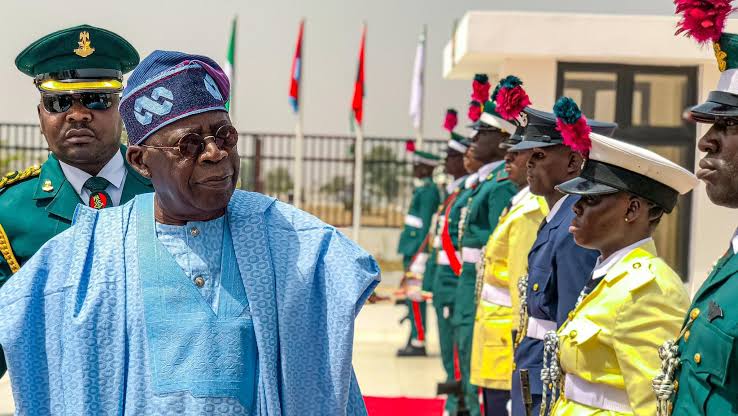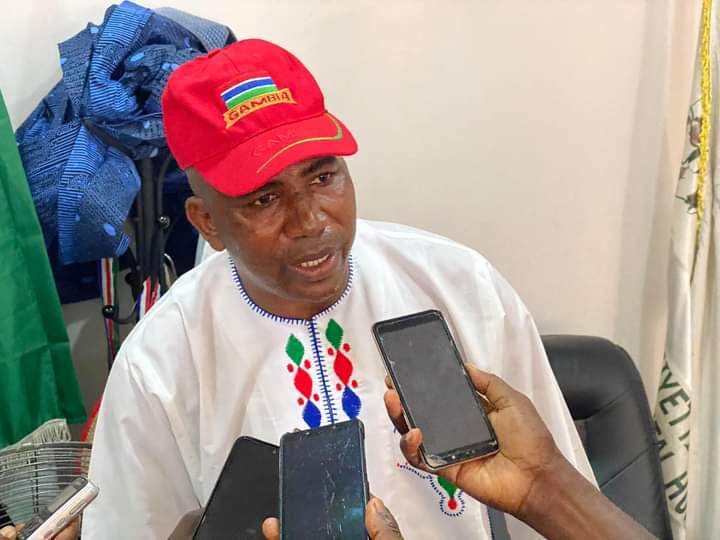Anxiety among cabinet members as President Tinubu orders his Ministers to give Nigerians their preformance report

President Tinubu marks first year in office with 47 ministerial progress showcase
Anxiety among cabinet members as President Tinubu orders his Ministers to give Nigerians their preformance report
To celebrate his first year in office, President Bola Tinubu has asked his ministers to share their progress with the public.
The Minister of Information and National Orientation, Mohammed Idris, announced a low-key event in Abuja where each of the 47 federal ministers will give media updates starting Thursday.
President Tinubu won the 2023 election with 8.7 million votes, beating Atiku Abubakar and Peter Obi. He made it clear during a cabinet retreat in November that ministers will keep their jobs based on performance, with evaluations happening every quarter.
In April, during an appearance on Arise TV’s News Night, the President’s Special Adviser on Policy Coordination, Hadiza Bala-Usman, who leads the Central Delivery Coordination Unit (CDCU) trained 140 officials in January to assess federal agencies. The unit had also received reports from 20 out of 35 ministries, with plans to involve citizens and experts in the evaluation process.
Bala-Usman said, “Our submission is for the first quarter. So, the first quarter has just ended, and we have initiated the assessment process. The ministers have all been asked to submit their performance based on the deliverables.”
She asserted ministers would be assessed “Based on what is out there in the public space. They would write to say, ‘Based on every deliverable you have given me, this is what I’ve done within the first quarter of the year.’
“Through the Citizens Delivery Tracker app, Nigerians will also say, ‘this is what we’ve seen the minister do’ and they would aggregate it.’’
The PUNCH reports that the Tinubu administration has enacted significant reforms to stabilize the economy, curb inflation, and attract foreign investments.
A major move was ending the corrupt fuel subsidy regime, which led to increased fuel and transportation costs, subsequently driving up food inflation and worsening economic hardships nationwide.
To address food inflation, the government has allocated substantial funds to the agricultural sector, including N200 billion to enhance agricultural productivity and ensure food security. Additionally, investments in irrigation and water bodies are being made to transition from single-season to year-round farming.
The administration has also injected N75 billion into supporting small and medium-sized enterprises (SMEs) to foster job creation and economic diversification. Furthermore, a N100 billion consumer credit fund has been launched to invigorate the manufacturing sector, boost production, and stimulate economic growth.
In terms of infrastructure development, the Tinubu administration has initiated a 100,000 renewable housing program across seven states to tackle the housing deficit and stimulate the construction sector. To mitigate high transportation costs and promote energy efficiency, the government has directed the purchase of compressed natural gas buses.
To enhance national security, significant portions of the budget have been allocated to security measures, alongside support for the establishment of state police.
These reforms and efforts to stabilize and grow the Nigerian economy have garnered recognition from international agencies and leaders.
The Central Bank of Nigeria (CBN) has also introduced several reforms to address the forex crisis. These include unifying multiple exchange rates into a single, transparent rate that reflects market dynamics more accurately and reduces arbitrage opportunities. The CBN has also boosted the supply of foreign exchange by promoting diaspora remittances, encouraging non-oil exports with rebates and better access to forex, and restricting forex for the importation of items that can be produced locally. The CBN regularly intervenes in the forex market by selling forex to banks through various auction mechanisms.
Regarding the first anniversary programs, the Minister of Information announced that there would be no extravagant celebrations to mark Tinubu’s one year in office.
Sectoral briefings
“The first anniversary of the president will be on a low key, with an emphasis on sectoral briefings by the various ministers. There will be no ceremonies relating to the one year in office of the president.”
During his address, the Secretary to the Government of the Federation (SGF), Senator George Akume, outlined the administration’s ambitious agenda focused on economic revitalization, social inclusion, and infrastructural development.
Akume emphasized that significant economic reforms have been enacted to stabilize the economy and foster sustainable growth.
These policies, he noted, have effectively attracted foreign investments, reduced inflation, and created jobs across various sectors.
“Let me begin by admitting that the first year in office for Mr. President has been a testament to the unwavering commitment and resilience of this administration towards serving the Nigerian people with diligence, integrity, and dedication,” Akume remarked.
“Despite daunting challenges, President Tinubu has maintained his calm and demonstrated exemplary leadership qualities, guiding our nation with vision and foresight. The government has implemented significant economic reforms aimed at stabilizing our economy and fostering sustainable growth. Key among these is the introduction of policies that have attracted foreign investments, reduced inflation, and boosted job creation across various sectors,’’ he further noted.
In his presentation, the Minister of Budget and Economic Planning, Abubakar Bagudu, highlighted that Tinubu’s administration inherited a low-revenue, shrinking economy but is committed to addressing these challenges through the Renewed Hope Agenda.
This agenda, Bagudu explained, was developed with extensive input from various stakeholders and focuses on eight priority areas critical for Nigeria’s progress.
Bagudu stressed the necessity of making tough decisions, pointing out that the countries Nigeria seeks to emulate made such choices long ago. He argued that the Renewed Hope Agenda involves confronting economic realities, which may cause temporary discomfort but are essential for achieving long-term stability and growth.
“We must restore a macroeconomic environment that can stimulate investment, generate revenue, and address under-investment in sectors like security, education, and social welfare,” Bagudu explained.
He highlighted that Nigeria’s current crude oil production is below its Organisation of Petroleum Exporting Countries quota due to under-investment in infrastructure and security.
He expatiated, “So we impact, as part of the Renewed Hope Agenda, on a macro-economic reform because that was what was responsible for low investment, low revenues and our economy’s size was shrinking, was too small compared to our needs.
“Nothing we do can solve the problem of under-investment in various sectors of the economy; be it security, be it education, be it social welfare, without restoring a macro-economic environment that can stimulate investment in our economy, which will generate revenues for us to fix security.
“That is why we are not even producing crude oil in the quantity we used to before, or as allowed by international convention, which is our OPEC quota, because of under-investment, whether in the physical infrastructure itself or security, and so on and so forth.’’
The minister emphasised that the administration is prioritising food security by investing in irrigation and water management to support year-round farming. He noted that similar efforts are being made to revitalize the livestock sector, which has historically been a source of conflict rather than economic growth due to under-investment.
He highlighted that the administration is also focusing on enhancements in infrastructure, education, health, the creative economy, the digital economy, and the steel sector.
Bagudu acknowledged that some government policies might cause temporary discomfort and pain. He argued that true leadership involves being honest with the people about the realities they face.
“Food security, despite our potential, we are under-investing. Most of our farmers are one-season-per-year farmers. So, when you have an asset that you only utilize four months in a year because you don’t have irrigation, you don’t have water bodies.
“Most of our fishing communities, they go to freshwater bodies where there’s no fish anymore, we have to transit them. The livestock sector, which in countries like New Zealand, is an important engine of growth, but in our country, due to cumulative under-investments, it has formed a basis for conflict rather than economic opportunity,’’ he lamented.
The former Kebbi State governor asserted that the President is committed to fiscal discipline, with plans to reduce the fiscal deficit from 6.11 percent in 2023 to below 4 percent in 2024.
He also revealed that the administration aims to increase capital expenditure to 39 percent, marking the highest level in Nigeria’s history. Additionally, he highlighted the introduction of a N100 billion consumer credit fund and a mortgage fund, designed to stimulate the manufacturing and housing sectors, respectively.
Budget allocations
Bagudu further revealed that substantial budget allocations had been directed towards national security, resulting in notable improvements in Borno, Imo, Kaduna, and Taraba states.
He emphasized Tinubu’s support for local government autonomy, ensuring that resources are efficiently utilized to benefit communities.
Bagudu outlined three significant budgets under Tinubu’s administration. He explained that the first, initially set at N819 billion, was renegotiated to allocate N500 billion for interventions supporting vulnerable populations.
He also highlighted the second budget, totaling N2.17 trillion, which prioritized national security, infrastructure, and cash transfers. Additionally, he noted that the 2024 budget aims to restore fiscal discipline and drive economic growth through increased capital expenditure.
The minister said, “The three budgets Mr President participated in the first, the N819b budget which he inherited, which was even passed into law before he came, he renegotiated with the National Assembly.
“He said ‘I want N500bn to fund intervention that will support the vulnerable populations, who might be affected by the reform measures.’ About N200bn went into agriculture; N75bn into the medium and small enterprise sector, as well as N40bn into the nano-credit sector.
“Equally, another budget of N2.17tn that went to support gains in national security, most of it to security and infrastructure and also providing more money for cash transfer and meeting commitments to labour.’’
The minister emphasised that the President has made it clear he won’t attribute the state of the nation to his predecessor.
Highlighting the advantages of the government’s programs and policies, he stated, “So, we believe that with consumer credit invigorating the manufacturing sector; with mortgages revitalizing the housing sector; and with the Agriculture Development Fund boosting the agricultural sector, our youth and productive economy will be energized.”
The minister mentioned that the allocation of N130 billion for transitioning to compressed natural gas (CNG) would enhance energy competitiveness and benefit the manufacturing and transportation sectors of the economy. The reduced energy costs would also support economic reforms.





